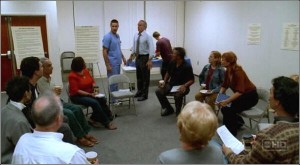Hi all—
Here’s an announcement before the main act: Please look at the Guest Memoirs page if you haven’t already. The first four memoirs are terrific, and hugely different. I hope that we’ll soon get more, and I hope people will leave comments on those already posted. It may seem hard to “comment” on something autobiographical….but just saying “I get how you must have felt,” one way or another, can mean a lot to someone who has just exposed themselves so openly.
The main act:
I haven’t published a post in a few weeks. I’ve had one part-written since the day after Persephone’s amazing post (see previous), but it remained in note form while I was busy with other things. Those things included my twin 6-year olds. Mama (my wife, Isabel) was in the States for 10 days, doing research (and staying in fancy hotels) while I slaved away here. It was more work than I’d expected, because the boys now go to an after-school daycare, where I need to pick them up, but I never seem to get there without getting lost and ending up in farm country. So that’s an hour out of my day, getting them to school in traffic is another 45 minutes, Dutch lessons plus practice – 4-6 hours per week, showing up for work at the university once in a while, cleaning up an amazing amount of trash left over from the intense Halloween party we had a couple of weeks ago (fabulous costumes, lots of food and wine, even a fire juggler) but did we have to buy 30 rolls of toilet paper so the kids could have a dress-the-mummy contest? Yet the main time drain was none of the above: it was keeping a lid on the kids. With Mama gone that long, they were bouncing off walls, ignoring my commands, arguing more, breaking rules. So I spent a lot of time disciplining these adorable little buggers…not my favorite parental duty.
 Which brings me back to Persephone’s post. The main problem with the 12-step approach, she says, is the freeze on emotional development they seem to demand, intentionally or not. So recovery becomes a way of not moving – it’s static. According to Persephone, the epitome of successful recovery in NA/AA is to sit around with the same people, year after year, sharing stories about how shitty it was being an addict, so that you can REMAIN clean or sober. It’s all about remaining a certain way rather than growing. As Persephone saw it, they tell you that your addiction is doing push-ups in the parking lot, or waiting to leap on you, so the only safe course is to stay here with us – stay being the operative word. And the result is that you continue to define yourself as an addict. In other words, not only the way you govern your life but your whole self-image is frozen in place. This is what you are, and if any change occurs, be warned: it’s going to be a change backward – back to being an addict who’s no longer in control.
Which brings me back to Persephone’s post. The main problem with the 12-step approach, she says, is the freeze on emotional development they seem to demand, intentionally or not. So recovery becomes a way of not moving – it’s static. According to Persephone, the epitome of successful recovery in NA/AA is to sit around with the same people, year after year, sharing stories about how shitty it was being an addict, so that you can REMAIN clean or sober. It’s all about remaining a certain way rather than growing. As Persephone saw it, they tell you that your addiction is doing push-ups in the parking lot, or waiting to leap on you, so the only safe course is to stay here with us – stay being the operative word. And the result is that you continue to define yourself as an addict. In other words, not only the way you govern your life but your whole self-image is frozen in place. This is what you are, and if any change occurs, be warned: it’s going to be a change backward – back to being an addict who’s no longer in control.
Persephone proposed the following: With your behavior, your choices, your capacity to explore, and your self-image all frozen in this way, and with the horror stories of your addiction constantly resurfacing, you are in the same condition as someone with PTSD –  post-traumatic stress disorder. What a concept! People with PTSD live with continuous anxiety, denial and avoidance mechanisms, intrusive thoughts, and more, about what happened to them, whether it was a serious accident, a mugging, physical or sexual abuse, rape, getting wounded in a war… And the therapeutic principle for recovery is pretty simple: you have to free yourself from those fears, from the anxiety that it’s still happening or will happen again, by reprocessing the event, with some sense of acceptance. Yes, it happened, but it’s over now. You have to do that before you can move on. Then you shift from a static state to a fluid state, let down your defenses, allow for the unexpected, and find the confidence that you can handle whatever comes.
post-traumatic stress disorder. What a concept! People with PTSD live with continuous anxiety, denial and avoidance mechanisms, intrusive thoughts, and more, about what happened to them, whether it was a serious accident, a mugging, physical or sexual abuse, rape, getting wounded in a war… And the therapeutic principle for recovery is pretty simple: you have to free yourself from those fears, from the anxiety that it’s still happening or will happen again, by reprocessing the event, with some sense of acceptance. Yes, it happened, but it’s over now. You have to do that before you can move on. Then you shift from a static state to a fluid state, let down your defenses, allow for the unexpected, and find the confidence that you can handle whatever comes.
So here are my kids in a state of anxiety. They’re not old enough to conceptualize how long 10 days will last. As far as they’re concerned, Mama is just plain gone. They love me a lot, and we sure got closer during this period. But their anxiety changed  everything! They regressed, they became more moody, aggressive, shut-down, or simply unregulated. And to continue the analogy with NA/AA, I became like their sponsor. Come to Papa when you start to lose it, and then do exactly as I say. Because the thing/person you really want is missing from your life, and you’re in danger of going from bad to worse. My style of parenting changed. Everything became more rule-bound, there were a lot more time-outs, consequences dished out, time deducted from weekend TV… In brief, living with anxiety takes its toll. I knew this as a psychologist anyway – I just got reminded: anxiety diminishes cognitive flexibility and creativity, and it draws attention to the negatives – whether you’re a motherless 6-year old or a boozeless 60-year old.
everything! They regressed, they became more moody, aggressive, shut-down, or simply unregulated. And to continue the analogy with NA/AA, I became like their sponsor. Come to Papa when you start to lose it, and then do exactly as I say. Because the thing/person you really want is missing from your life, and you’re in danger of going from bad to worse. My style of parenting changed. Everything became more rule-bound, there were a lot more time-outs, consequences dished out, time deducted from weekend TV… In brief, living with anxiety takes its toll. I knew this as a psychologist anyway – I just got reminded: anxiety diminishes cognitive flexibility and creativity, and it draws attention to the negatives – whether you’re a motherless 6-year old or a boozeless 60-year old.
My kids became dry drunks for over a week.
One of the coolest (but still experimental) treatments for PTSD is to relive the traumatic event while you’re taking beta blockers, drugs that reduce sympathetic arousal. This article describes the approach. So why should that work? Are you just relieving anxiety over time? No, the theory says you are interfering with the maintenance of traumatic memories. Memory strength and endurance depend on a kind of rehearsal process. You have to keep on reliving the memory (at least some version of it) while feeling the emotions that came with it – e.g., the fear unleashed when a trauma occurs, or maybe that stew of shame, anger, and horror that comes with addiction. (I still vividly remember the time I shot the heroin left in “the cotton” from a junkie with yellow eyeballs, broadcasting hepatitis – and I get a jolt of disgust and shame each and every time.) Without that emotional charge, the memory fades…just like other memories.
Memories are encoded in the connections (synapses) between brain cells. You have to reinforce those connections (keep strengthening those synapses) to keep vivid memories vivid. Strong emotions like anxiety activate or facilitate synaptic cascades (e.g., in the amygdala). Anxiety also does the job of connecting novel events to that ball of fear at the core of the trauma, thus extending the synaptic network still further. With beta blockers in your blood, you can relive the memories without the anxiety, allowing the memories to become diluted or dissipated. They start to dissolve and lose their hold on you. Then you can spread your wings and fly, rather than remain frozen with your wings permanently clipped (Persephone’s words, with a nod to Lennon & McCartney). That’s when your emotional world starts to grow again.
 According to Persephone, many/most 12-step groups intentionally reinforce a PTSD-like state: Be afraid…be very afraid… Sort of like the opposite of trauma treatment using beta blockers, many 12-step groups seem to kindle the very emotions that cement your already vivid memories of when you were seriously fucked up. Almost like telling scary stories to keep little kids in line.
According to Persephone, many/most 12-step groups intentionally reinforce a PTSD-like state: Be afraid…be very afraid… Sort of like the opposite of trauma treatment using beta blockers, many 12-step groups seem to kindle the very emotions that cement your already vivid memories of when you were seriously fucked up. Almost like telling scary stories to keep little kids in line.
But sometimes it works: because living with PTSD is one way to keep away from danger. After getting mugged or raped, you won’t go strolling through city parks at night, you’ll stay inside when the parade comes by, you’ll avoid people of a certain type, you might avoid eye-contact with strangers altogether, and you’ll continue to see yourself as a victim or a loser. Not only is that a static state; it’s also an unhealthy state. It maintains anxiety rather than relieving it. You stay clean because you stay scared.
If that’s the solution offered by many 12-step programs – to plug yourself into a static state of PTSD in order to avoid the dangers of relapse – then I can sure see why a lot of people don’t sign on, or stay for a while and then get out. I can see why the notion of a lifetime addict can be a self-fulfilling prophecy. And I can see how people get hurt, sometimes badly hurt, when they try to break free: because they may actually get chastised for wanting to leave their PTSD behind — and that hurts.
For the most serious, interminable addictions, this might well be worth the price. We’ve heard a number of claims to that effect. But for those who do have the capacity to continue growing, leaving their addictions behind and moving on, it doesn’t sound like an ideal solution.
Please note! I’m not trying to rekindle the debate as to the pro’s and cons of AA/NA. Been there, done that. I’m just trying to build a clinical and neural extension onto the perspective of one person – who seemingly reflects the experiences of many others (judging from comments received!) – people who didn’t find what they needed.
Next post, coming in a few days, I’m going to zoom in on the relation between anxiety, memory, and habit formation – both in the development of addiction and in recovery seen as a developmental process — by looking more closely at what’s happening in the brain.

Leave a Reply